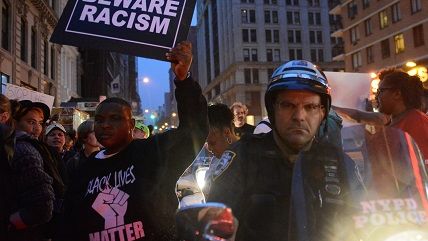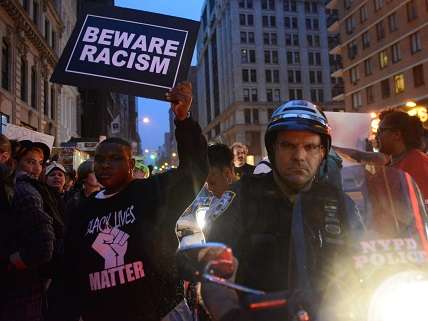Cops Can Stop Harassing People, if Voters and Politicians Stop Pushing Laws That Make Them
The power's with the people.


As police violence returns into the mainstream news cycle with the killings of Alton Sterling and Philando Castle by cops as well as of 19-year-olds Pedro Villaneuva and Dylan Noble, and others, people struggle to find solutions to the problem or narratives about it that fit their pre-existing ideologies (though often missing that Black Lives Matter has released a comprehensive set of reform policy proposals—I sometimes wonder how much of a lobby it would be if half the protesters of the last week spent half an hour contacting the offices of local representatives and candidates about specific Campaign Zero proposals as well).
Over at Salon, Daniel Denvir argues that part of the problem is the criminalization of the hustle. He points out that Eric Garner was killed by police in New York over selling loose cigarettes and Sterling in Baton Rouge over selling CDs. "Informal workers win some freedoms and flexibility in communities otherwise dominated by precarious service sector jobs," Denvir writes, while complaining that they're "not guaranteed a minimum wage, and earn no unemployment, Social Security or other benefits."
Then he hits a blind spot. "They are also, by virtue of the illegality of their business," he writes, "prima facie subject to aggressive policing." While acknowledging selling loose cigarettes and CDs is "just the tip" of an "iceberg of informal work" that could represent the source of more than $2 trillion in underground income, according to a 2011 study, he misses the point that such work can be decriminalized.
"The contemporary era of policing and mass incarceration emerged precisely to confront black people with limited or no access to formal work," Denvir writes, skipping the solvability of the illegality of work that is inherently non-violent for the far more difficult and persistent problem of racism.
People like Sterling and Garner, and countless others who are regularly harassed by law enforcement but against whom deadly force was not used, are engaged in work that is inherently non-violent. The sale of loose cigarettes is banned because governments feel they ought to have a cut of that action. The sales taxes paid on the loose cigarettes when they're bought by loosey sellers are often paid in other jurisdictions than the ones where they are sold. People like Garner are engaging in free enterprise—finding a product at a lower price point than selling it at a higher one in a fashion (one by one) unavailable from brick and mortar sellers.
A decade ago, I wrote about rappers in New York City who eschewed the quest for a record deal by producing and selling their own CDs in Times Square. They all said they did pretty well, and it certainly appeared so when I followed their daily routines. Unfortunately the piece, a masters' thesis for Columbia, no longer exists online. Last summer, New Yorkers were calling for a police crackdown on costumed characters in Times Square, performers often doing nothing more than selling photo ops for some cash. Whether or not and how much laws against the sale of loose cigarettes and other merchandise, "quality of life" laws and other laws that drive certain inherently non-violent economic activity into the underground are rooted in racism, they are laws that have been passed by the government and can be repealed by it. This solution has often been dismissed.
New York City Mayor Bill de Blasio (D), a progressive lauded upon his initial election, roundly rejected the idea that the city could back off on enforcing the kind of petty laws that put the livelihoods, and sometimes lives, of people like Eric Garner in danger. In fact, he insisted police would continue to "strictly enforce" such laws. "The law is the law," de Blasio helpfully added. Complying with police was what "democracy" was all about, according to New York Police Commissioner Bill Bratton. Worse, when police in New York slowed down on making "unnecessary arrests" after two cops were shot and killed in December 2014, rather than being praised for refusing to arrest people unnecessarily, they were lambasted by outlets like The New York Times, which suggested "withdrawing policing from minority communities" could constitute a civil rights violation. The period saw a 94 percent drop in traffic citations, a 92 percent drop in parking citations, and a 66 percent drop in arrests, without any sign in a rise of the crime rate or an unwillingness by police to apprehend and arrest violent criminals.
As I wrote last year, police kill people in part because we want them to. Police are a democratic institution—the privileges and immunities cops enjoy and the laws they are given to enforce come from a democratic process and can be reformed in that way. (Bernie Sanders pointed to police departments as examples of everyday socialism.) Repealing such laws that unnecessarily make targets out of people otherwise engaged in peaceful activity would not only reduce police violence but also tackle the problem of racism in police violence, as many of these laws have a disparate racial impact and contribute to the racial inequities in policing.
Police today are left told by democratically-elected governments to enforce petty laws strictly while also given privileges and immunities by those governments that make it difficult, if not impossible, to fire some officers absent of a criminal conviction. This puts the communities they police in danger, by creating police interactions where violence is introduced to otherwise non-violent behavior. It also puts police in danger, by forcing them into unnecessary interactions and by creating such protections from there, largely through police contracts and state laws, that public outcry often seems like it'd be more likely to produce a criminal charge (but not necessarily a conviction) than a termination. All the officers involved in the death of Freddie Gray (alleged by police to have an illegal knife) in police custody have retained their jobs. Those who have been tried so far have been found not guilty.
It ought to be possible to terminate cops short of criminal convictions for incidents like that involving Gray's, and it is possible, with reforms to union contracts and the legal relationship between the police department and their local governments, solutions missed by a focus on individual cops involved in egregious situations tinged with racism instead of on the systemic problems that catch an untold number of people, black, white, and every other color, in a policing system that, by its virtue as law enforcement, is prima facie a tool of violence. Every law is capable of costing lives in its enforcement, a key piece of understanding to reduce police violence.


Show Comments (83)